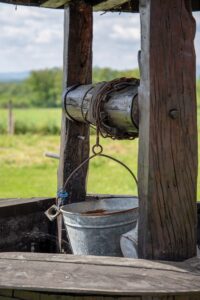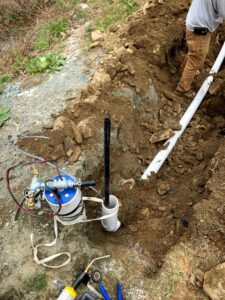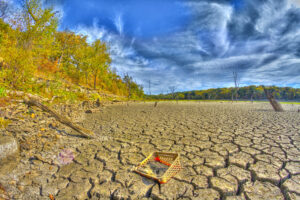What Will You Do If Your Water Well Runs Dry?
Nothing beats cold water for quenching thirst, and no other water tastes as pure and chemical-free as well water.
People with wells can taste the difference between private well water and municipal (city) water right away.
Because Florida is blessed with a plentiful supply of water, the answer to the question “Do Water Wells Run Dry?” is yes, although not frequently.
That isn’t to say they can’t run out of water if we don’t start thinking about water conservation.
Because wells are reliant on annual rainfall, local climate and weather activity have a direct impact on well water levels.
Jon’s Well and Pump Services provides the following recommendations for recognizing low water levels, their causes, and solutions as a service to local well owners. 
How to Determine If You Have Well Water Issues
The majority of well owners are aware that modest variations in their well water occur seasonally.
These are common occurrences, and there is usually nothing to be concerned about.
On the other hand, there are situations when well water difficulties necessitate at least a professional examination to decide whether further action is required.
Some of the more common and dangerous symptoms are given below. Please let us know if you encounter any of them.
A Change in Flavor or Smell
It’s common to have a minor taste difference now and again.
The majority of these can be accounted for by the seasonal ebb and flow of natural earth cycles, and they are minor.
However, your well needs to be immediately tested if there is a significant, dramatic change in flavor.
The same may be said for odor. A musky or swampy odor is rare and should not be overlooked.
A strong odor should also be immediately investigated.
Low Pressure
Water flow that is noticeably weaker or slower can be a sign of impending water problems.
Check the flow of the faucets throughout the house to determine if they are slower than usual.
Start with the sink that is the furthest away from the point where the water enters the house.
There is a potential problem if all of the pressures are weak.
Check the dishwasher or washing washer mechanically if it is taking longer to fill. If they don’t appear to be broken, you should have your water supply checked.
The Pump Runs Continuously
Listen to how often and for how long your well pump comes on.
Excessive or continuous pumping indicates a faulty water pump or a flow source that isn’t adequate.
Many well pumps are located too far away from the home to be heard or noticed on a daily basis. If this is the case, have a light connected to the well pump installed by an electrician. 
When the pump runs, the light turns on. Keep track of how often the light comes on and how long it stays on.
Pockets of Air in the Line
Air pockets can indicate a clogged drain or low line pressure.
Your waterline has air in it if it spits and sputters when you turn it on. When the water level in a line drops, air fills the space.
Low well water causes the line to flow unevenly.
Water that is discolored or murky
Water that isn’t crystal clear is most likely unsafe to drink.
If the well’s water level drops too low, the pump’s foot valve can start pumping silt and mud mixed with water into the line.
Even if the murkiness goes away, this silt can coat the inside lining of the water line and potentially pollute drinking water over time.
Other Wells in the Area
Other wells in your area could potentially be a warning sign for yours. If your neighbors’ wells are drying up, have Jon’s Well and Pump Services inspect yours.
You may or may not be affected, depending on the water supply for your well.
What Could Be the Root of the Problem?
Excessive Water Consumption
Large families necessitate a lot of water. Heavy laundering, frequent large-load dishwashing, and long, frequent showers can deplete water supplies.
Using all three at the same time will quickly deplete well water levels. When well water levels and pump capacity are exceeded, wells can take a long time to recover and eventually run dry.
Leak in the Line
Low water levels are frequently caused by water line leaks.
If the leak is beneath the line rather than on top of it, it can be very impossible to see with the human eye.
They can frequently leak for days or weeks before saturating enough ground to be observed.
Long-term, major line leaks can swiftly deplete well water levels and burn out pumps that are constantly pumping the leaking water.
Extended Drought
Annual rain and snow recharge underground water supplies on a regular basis.
Ground water levels are lowered when these cycles are disrupted. 
The natural water supply continues to dwindle as periodic precipitation delays last weeks or even months.
If a drought is severe enough, the water supply will run dry. Reduce your water consumption to help your well during weather droughts.
What Can You Do If Your Well Is Dry?
There are several methods available to homeowners who want to enhance their water supply without drilling a new well.
It’s possible that the source of the problem is as simple as the location of the water pump.
The pump in most wells is a submersible pump, which is positioned underwater within the well. When water is drawn below the pump’s level, the pump will instead introduce air into the system.
This problem can be swiftly resolved by hiring an expert to measure the water depth and lower the pump.
Another issue could be old age. A well’s life expectancy is estimated to be between 20 and 30 years. Because of silt, yield may decrease over time.
Deepening a water well is another approach to boost the well’s supply.
When a well is drilled deeper, fresh water-filled fractures can be uncovered. The chances of finding a fresh water-filled fracture rise as you move deeper into the ground, although this is not always the case.
Jon’s Well and Pump Services, a top-rated well drilling company, will advise you on the best solutions for your well problems and take care of them for you.
Will your water well run dry? Hopefully not, but if so, call us!


